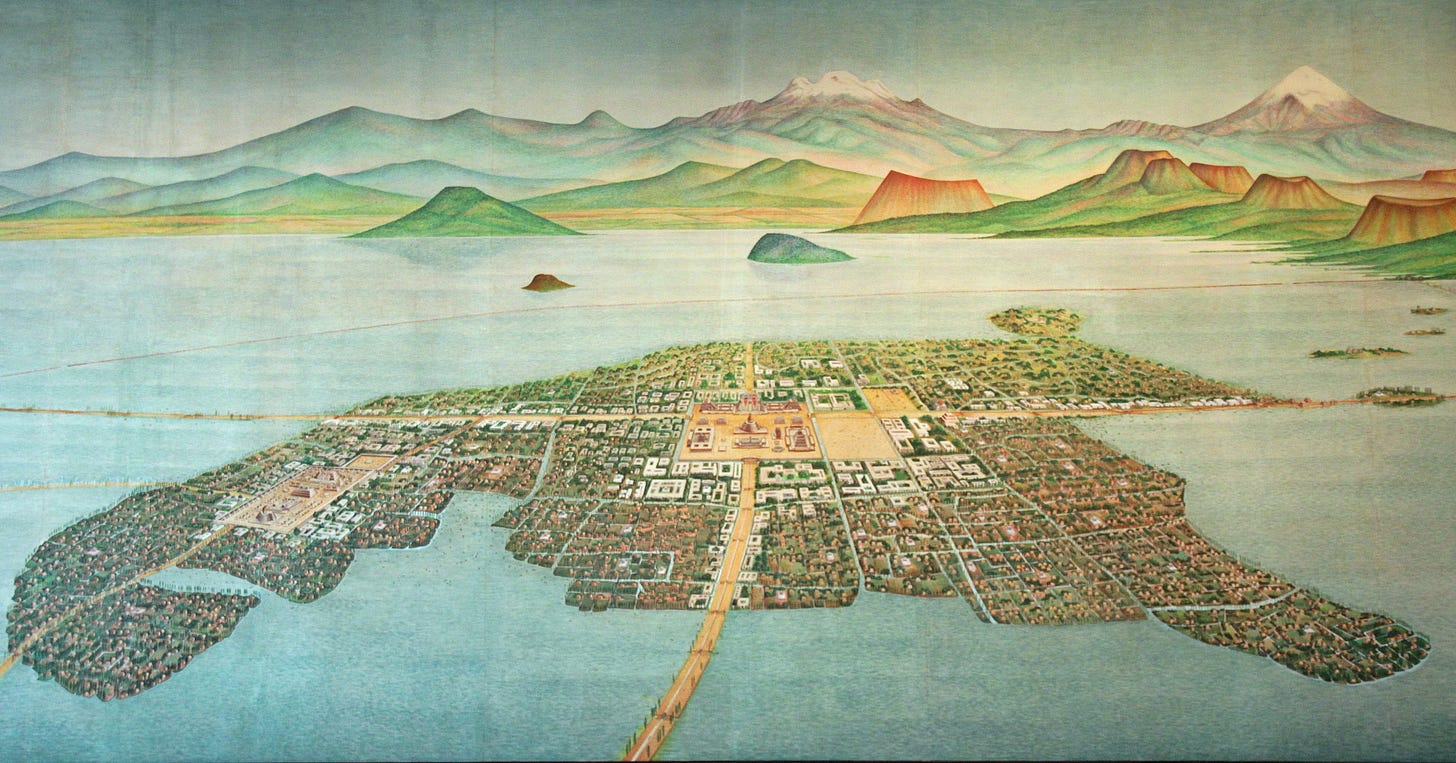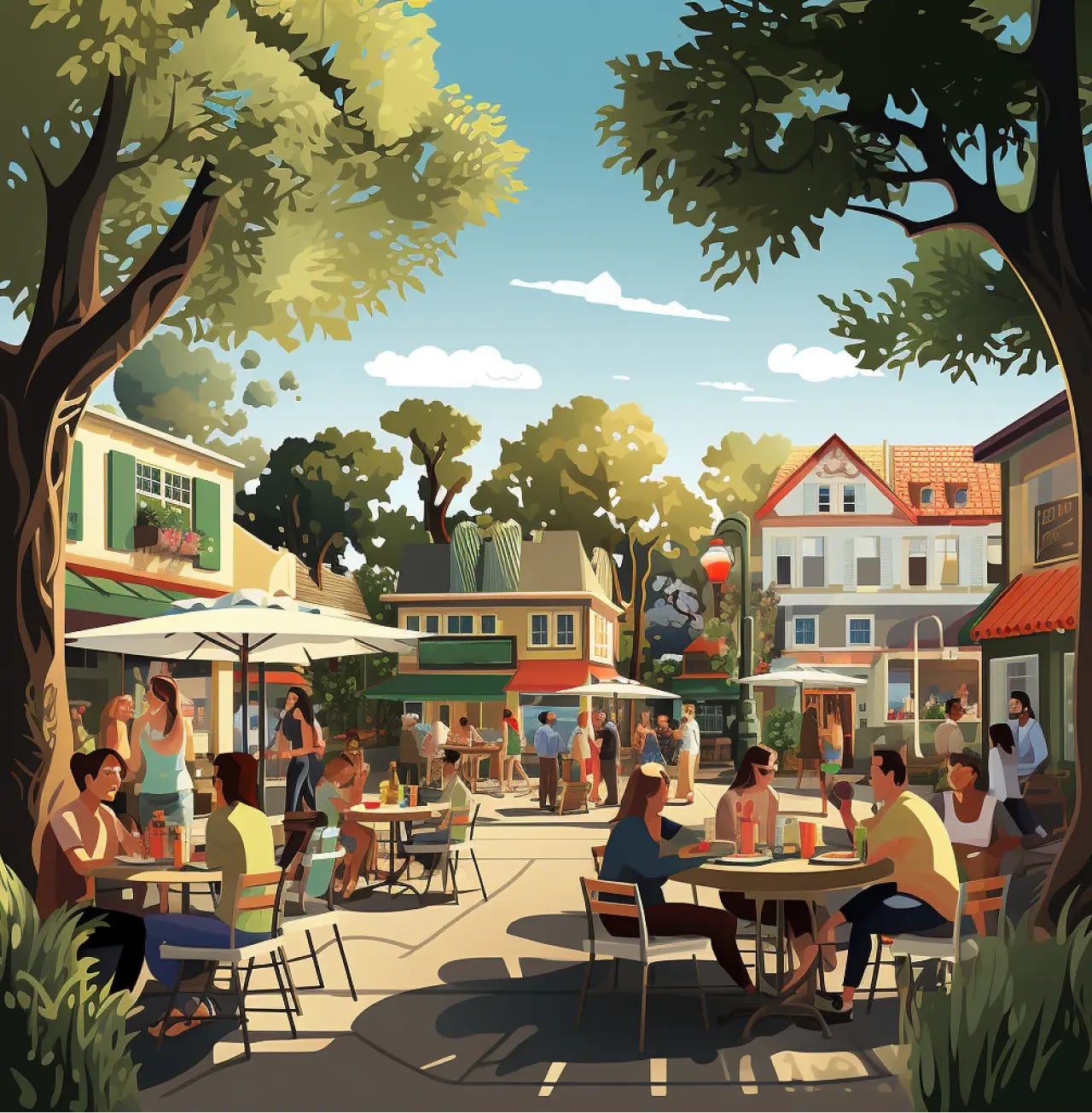Retreating to Digital Villages From The Algorithmic Scenes
Also: California Forever, BasePaint, and Hop!
In reading Jay’s article on the audience and the algorithm, I too lament what feels like a loss for creators in the web of 2023. It’s giving peak web that feels like on the way down, will fall apart in ways we’ve yet to fathom.
This is all to say that if you think social media is fragmented and difficult as a user – imagine being a creator. The environment that they, we, I, are pushing work out into has totally changed. The game is over and we’ve all lost. We now have a fractured mediascape with smaller audiences and limited opportunities for growth.
The algorithm absorbing more and more, spits out content to the right people. In the worst case scenario is TikTok where success is way more slanted to the algorithm than your actual audience. And thus, as Jay said, there’s a retreat towards the audience. In some sense, it feels like Skunk Ledger’s article on Scenes and Villages. As scenes are cracking, creators are retreating to the village (digital and physical).
The village, as described, is the diverse local environment. It’s the spirit of humanity.
One kind is the village. You're born into it. There are aunties and dentists and storekeepers and bookish sons of family friends and gossips and nerds and basics and pranksters and legends and dead people and teacher-coaches and scolds and mystics and husbands and pals. Casseroles materialize when they're needed. People tell you to turn left where the gas station used to be.
The scene is about the “thing”.
Scenes are productive. They "empirically work to produce absurd miracles". They have short, blazing lifespans, attracting the people at the extreme of a particular combination of traits and amplifying them against each other to spray outsize returns everywhere. If you're pointy on some trait – and many people are – or if you're ambitious, or both, going to live among similar people is a simple way to propel yourself. The standards are higher. The tacit knowledge transmits on the breeze. You're surrounded, held, by the thing you care about.
I think what we are losing are the scenes that were glued together by specific algorithms. In some sense, these scenes wouldn’t exist to the extent that they do (and did), if it weren’t for the algorithms pulling people together. When I think about crypto, for example, it’s core gravity well was/is Twitter. I believe there are many creative industries that were held together by it. I look at the writing and publishing industry and many writers are lamenting the loss of relationships and revenue as a result.
And so, with the loss of certain algorithmic scenes, we’re retreating back to the village: cozy core Discord groups, IRL events, newsletters, blog rolls, and the touch grass vibes. Heck, even tapes are making a comeback (ht Jarrod).
In truth, I think that’s in part why the creative strikes in Hollywood have been so successful this year. The creators are actually meeting others on the picket lines, forming new connections away from aggressive algorithm: that thing that now also pays you on Twitter to be controversial.
Some scenes will die, never to be seen again, but what I would wish for the next era of the web, is that we don’t then lose the people that the algorithm brought together.
We need to build cities with our digital infrastructure:
I suspect great cities have both scenes and villages; scenes as exports, villages to keep the city human and anchor it in time, beyond the volatile epicycles of scenes.
I don’t know necessarily know how, but the new village era of the web has a unique sense of serendipity to it, feeling like you are falling into new spaces as if you are meandering through a bustling city.
The reason why cities work and why they continue to thrive, is because ultimately, the people within in it are the glue. When visiting Mexico City (which I’m doing for the first time this week), it’s hard to find evidence that all of this was once a lake and home to the Aztec city of Tenochtitlan. Cities are made up of generations and generations of people, built and rebuilt through many ups and downs (and yes, in some instances being conquered and colonized :( ).
In London, the old Roman walls peek through it next to the Thames. In Wall Street, in New York City, it’s named after the literal wall that once protected New Amsterdam. Cities are incredibly resilient.
Now that some of our scenes are withering away and we’re retreating to the physical and digital villages, how do we rebuild our scenes? Is there a digital city here that we need to rebuild? Where do we go from here? Should we link hop blog rolls again, strolling through them? Wade into new Discord neighbourhoods and say hi? Go IRL and distribute physical again?
At the very least, there’s a sense of liberation in this trough.
For the best part of a decade, people have been making content for an algorithm, not the audience. Worse, they haven’t been creating things for themselves. So if the feeds can no longer be relied upon to put content in front of new eyeballs then people are free to make the things that they want to make. Rather than making things that float well at the frothy surface of the social seas.
As Jay mentions, maybe start by supporting your favourite creator. ❤️
More Links!
IP & Generative AI
I enjoyed this take on generative AI from Ben Evans on how we should be thinking about ownership and remuneration. Level-headed and takes into account different parts of the conversation.
The conclusion mimics a lot of my (sometimes confused) feelings:
A few weeks ago, in an art gallery in London, I saw a Durer print that wasn’t a Durer print - it was a copy, made in around 1506 by Raimondi, a student of Raphael. Vasari tells us that Durer was furious and went to court in Venice. I treasure the idea of Venetian magistrates trying to work out how to think about this: their verdict was that Raimondi could carry on making the copies, but could no longer include Durer’s logo. That was a case about intellectual property, but the verdict is also a neat split between two ideas of authenticity. Do we care who made it, and why, or do we just want the picture? That's why some people are horrified by music generators or Midjourney, (or, 150 years ago, were horrified by cameras), and others aren't worried at all.
Both are probably right. I think context matters more and more, and thus, we care who made what.
But, we’ve also been around creative works where we didn’t really care who made it. The story will continue to play out. :)
California Forever in Solano County
For now, the project is dubbed, California Forever.
As a city nerd, I love the idea of new cities, but I’m also always raising eyebrows at the *why*. Often times, it’s a desire to exit from the realities we face in city-life as-is. I’m generally more tilted in the direction of attempting to fix the cities we do have, before building new ones, because ultimately, new cities won’t be immune to the eventual same problems down the line. But, being a city maximalist: make our cities better, and also build new cities. Ultimately, we hope that *all* people win from a competition of cities. It’s a negative indictment on our capability to organise if upstart utopian cities will fare better in the future. I doubt they will, but I say: let them try. :)
BasePaint
One of my favourite new NFT projects to follow is BasePaint. Every day, a group comes together (if you have a brush) and paint a new picture, pixel by pixel, according to a theme. After it’s done, it’s sold as an open edition NFT with the proceeds going towards the people who created the artwork (based on how many of your pixels made the final cut).
Here’s the Pokemon one, being drawn.
If you are also a smart contract dev, do also take a look at the contract breakdown. This projects is a fun combination of all the things that make the web + blockchain great: collaboration + sharing rewards from its creation.
Macadam, Mezerg - Hop!
This week’s track is another thumping, krautrock-esque indie tune. I’m a sucker for these tracks. One’s that kind of build and keep going.
That’s it for this week. A bit shorter than usual. But, I’m in Mexico City for the first time and I have more exploring to do!
Enjoy a sunset and see you next week!
Simon




